#Full Stack Developer Course
Explore tagged Tumblr posts
Text
The Roadmap to Full Stack Developer Proficiency: A Comprehensive Guide
Embarking on the journey to becoming a full stack developer is an exhilarating endeavor filled with growth and challenges. Whether you're taking your first steps or seeking to elevate your skills, understanding the path ahead is crucial. In this detailed roadmap, we'll outline the stages of mastering full stack development, exploring essential milestones, competencies, and strategies to guide you through this enriching career journey.

Beginning the Journey: Novice Phase (0-6 Months)
As a novice, you're entering the realm of programming with a fresh perspective and eagerness to learn. This initial phase sets the groundwork for your progression as a full stack developer.
Grasping Programming Fundamentals:
Your journey commences with grasping the foundational elements of programming languages like HTML, CSS, and JavaScript. These are the cornerstone of web development and are essential for crafting dynamic and interactive web applications.
Familiarizing with Basic Data Structures and Algorithms:
To develop proficiency in programming, understanding fundamental data structures such as arrays, objects, and linked lists, along with algorithms like sorting and searching, is imperative. These concepts form the backbone of problem-solving in software development.
Exploring Essential Web Development Concepts:
During this phase, you'll delve into crucial web development concepts like client-server architecture, HTTP protocol, and the Document Object Model (DOM). Acquiring insights into the underlying mechanisms of web applications lays a strong foundation for tackling more intricate projects.
Advancing Forward: Intermediate Stage (6 Months - 2 Years)
As you progress beyond the basics, you'll transition into the intermediate stage, where you'll deepen your understanding and skills across various facets of full stack development.
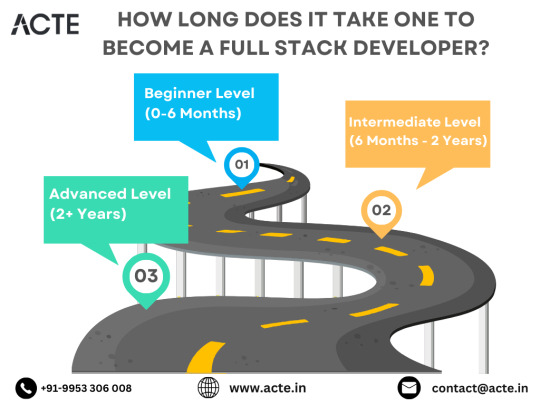
Venturing into Backend Development:
In the intermediate stage, you'll venture into backend development, honing your proficiency in server-side languages like Node.js, Python, or Java. Here, you'll learn to construct robust server-side applications, manage data storage and retrieval, and implement authentication and authorization mechanisms.
Mastering Database Management:
A pivotal aspect of backend development is comprehending databases. You'll delve into relational databases like MySQL and PostgreSQL, as well as NoSQL databases like MongoDB. Proficiency in database management systems and design principles enables the creation of scalable and efficient applications.
Exploring Frontend Frameworks and Libraries:
In addition to backend development, you'll deepen your expertise in frontend technologies. You'll explore prominent frameworks and libraries such as React, Angular, or Vue.js, streamlining the creation of interactive and responsive user interfaces.
Learning Version Control with Git:
Version control is indispensable for collaborative software development. During this phase, you'll familiarize yourself with Git, a distributed version control system, to manage your codebase, track changes, and collaborate effectively with fellow developers.
Achieving Mastery: Advanced Phase (2+ Years)
As you ascend in your journey, you'll enter the advanced phase of full stack development, where you'll refine your skills, tackle intricate challenges, and delve into specialized domains of interest.
Designing Scalable Systems:
In the advanced stage, focus shifts to designing scalable systems capable of managing substantial volumes of traffic and data. You'll explore design patterns, scalability methodologies, and cloud computing platforms like AWS, Azure, or Google Cloud.
Embracing DevOps Practices:
DevOps practices play a pivotal role in contemporary software development. You'll delve into continuous integration and continuous deployment (CI/CD) pipelines, infrastructure as code (IaC), and containerization technologies such as Docker and Kubernetes.
Specializing in Niche Areas:
With experience, you may opt to specialize in specific domains of full stack development, whether it's frontend or backend development, mobile app development, or DevOps. Specialization enables you to deepen your expertise and pursue career avenues aligned with your passions and strengths.
Conclusion:
Becoming a proficient full stack developer is a transformative journey that demands dedication, resilience, and perpetual learning. By following the roadmap outlined in this guide and maintaining a curious and adaptable mindset, you'll navigate the complexities and opportunities inherent in the realm of full stack development. Remember, mastery isn't merely about acquiring technical skills but also about fostering collaboration, embracing innovation, and contributing meaningfully to the ever-evolving landscape of technology.
#full stack developer#education#information#full stack web development#front end development#frameworks#web development#backend#full stack developer course#technology
9 notes
·
View notes
Text
A Full Stack Developer Classes equips you with essential front-end, back-end, and database skills. Learn technologies like HTML, CSS, JavaScript, Node.js, and React to build end-to-end applications. Perfect for aspiring web developers, this course offers hands-on projects and industry-relevant training, opening doors to high-demand jobs in tech. Start your full-stack journey today!
Business name: Full Stack Developer Course In Pune
Address: Office no- 09, UG Floor, East Court, Phoenix Market City, Viman Nagar, Pune, Maharashtra 411014
Phone: 9513260566
Email: [email protected]
0 notes
Text
How Long Does It Take to Learn Node.js?

Node.js is a popular tool that helps developers build fast and efficient applications. JavaScript can be executed on the server side thanks to it. If you're thinking about learning Node.js, you might wonder how much time it will take. In this blog post, we will look at how long it usually takes to learn Node.js, based on different factors.
What is Node.js?
Node.js is a free and open-source software that lets you run JavaScript on servers. It's known for being fast and good at handling many tasks at once. This makes it a great choice for building real-time apps.
Factors Affecting Learning Time
The time it takes to learn Node.js can vary depending on a few things:
Your Programming Experience: If you already know JavaScript or other programming languages, learning Node.js will be easier and quicker. It may take longer if you are not experienced with programming.
Learning Methods: The tools and methods you use to learn Node.js can make a big difference. Online courses, tutorials, and hands-on projects all help you learn at your own pace.
Time You Spend: How much time you put into learning Node.js each day or week will affect how quickly you learn. The more time you spend, the faster you’ll progress.
Project Complexity: Working on real-world projects can help you learn faster. The more complex the projects, the more you'll learn.
How Long to Learn Node.js?
Here’s a rough idea of how long it might take to learn Node.js based on your experience level:
Beginners (No Programming Experience):
Basic Skills: 2-3 months. You'll learn JavaScript basics and start with simple Node.js projects.
Intermediate Skills: 4-6 months. You’ll tackle more complex projects and learn about frameworks like Express.js and databases like MongoDB.
Advanced Skills: 6-12 months. You’ll be able to build advanced applications and work professionally with Node.js.
Intermediate Programmers (Know JavaScript):
Basic Skills: 1-2 months. You’ll quickly understand Node.js and start working on projects.
Intermediate Skills: 2-4 months. You’ll dive into more advanced topics and tools.
Advanced Skills: 4-8 months. You’ll be able to handle complex projects and optimize performance.
Experienced Developers (Know Server-Side Programming):
Basic Skills: 1 month. You’ll learn Node.js fast and start building applications.
Intermediate Skills: 1-3 months. You’ll work on advanced topics and integrations.
Advanced Skills: 3-6 months. You’ll master Node.js and lead projects.
Tips to Learn Node.js Faster
Practice Regularly: Build projects to practice what you learn. Begin with smaller tasks and work your way up to larger ones.
Join a Community: Connect with others who are learning Node.js. They can provide support and share helpful resources.
Use Good Resources: Choose high-quality courses and tutorials. They can help you learn more effectively.
Stay Updated: Node.js changes often. Keep learning about new updates and best practices.
Conclusion
Learning Node.js takes time, and how long depends on your experience and how much effort you put in. Beginners might take several months, while those with programming experience can learn faster. By practicing regularly and using good resources, you can become skilled in Node.js and use it to build great applications.
#Full stack developer course in Coimbatore#Full stack developer course#Full stack development#Full stack web developer courses
0 notes
Text
The Full Stack Developer course at NICE Computer institute in Pitampura, Delhi, offers a robust educational experience for anyone looking to become proficient in web development. With a curriculum that spans essential technologies and practical applications, this course is an excellent choice for those seeking to enter the dynamic field of full-stack development.
0 notes
Text
0 notes
Text

Become a Full Stack Developer in Tilak Nagar: Learn Coding from Scratch Full Stack developer training institute in Tilak Nagar and learn coding from the ground up with Dice Academy! This program covers everything you need to know, from building websites to managing databases. Perfect for beginners, our hands-on training will equip you with the skills to create complete web applications. Start your journey to becoming a skilled developer and open up exciting career opportunities in the tech world!
0 notes
Text
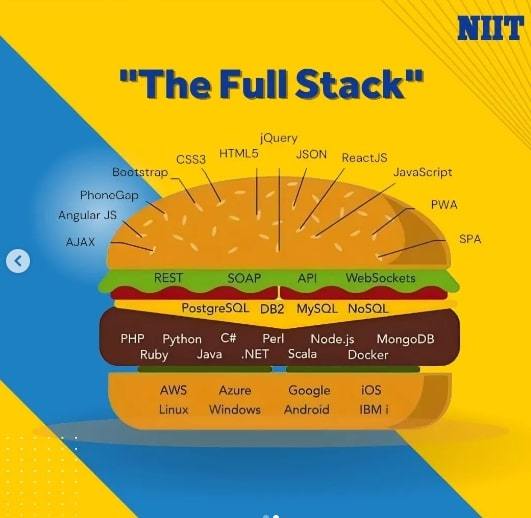
Comprehensive Full Stack Developer Course
Enroll in our full stack developer course to master front-end and back-end technologies. Gain practical skills and certification for a thriving tech career.
0 notes
Text
How to Choose the Best Full Stack Developer Course
In today's rapidly evolving tech landscape, becoming a full-stack developer can open doors to numerous career opportunities. A full-stack development training program is essential in acquiring the skills to build both front-end and back-end applications. However, choosing the right one can be daunting, given the many courses available. This guide will help you select the best Full Stack Developer course for your needs.
Define Your Goals and Learning Objectives
Before exploring course options, it’s crucial to clarify your goals. Are you looking to switch careers, enhance your skill set, or explore a new hobby? Comprehending your objectives will help you identify the course that aligns with your aspirations. For instance, if you aim to secure a job as a full-stack developer, look for courses that offer comprehensive training and job placement assistance.
Consider Your Current Skill Level
Assess your knowledge and experience in web development with training programs ranging from beginner to advanced levels. If you are new to coding, opt for a beginner-friendly course that covers the basics of HTML, CSS, and JavaScript before delving into more complex topics. Conversely, if you have some experience, an advanced course focusing on modern frameworks and tools might be more suitable.
Course Curriculum
A well-structured curriculum is the backbone of any effective training program. Ensure the training covers the following key areas:
Front-End Development: HTML, CSS, JavaScript, and popular frameworks like React or Angular.
Back-End Development: Server-side languages like Node.js, Express.js, Python, or Ruby on Rails.
Databases: SQL (MySQL, PostgreSQL) and NoSQL (MongoDB) databases.
Version Control: Git and GitHub.
Deployment: Understanding cloud services like AWS, Heroku, or Azure.
Security: Basic principles of web security and best practices.
Check if the course offers hands-on projects and real-world applications, as practical experience is crucial for mastering full-stack development.
Learning Format: Online vs. In-Person
Which do you prefer: online or in-person learning? Each format has its pros and cons:
Online Courses: Offer flexibility, allowing you to learn at your own pace and schedule. They are often more affordable and accessible from anywhere. However, they require self-discipline and motivation.
In-person courses: These provide a structured learning environment with direct interaction with instructors and peers. They can be more engaging and offer immediate feedback but are less flexible and often more expensive.
Instructor Expertise
The quality of instruction can largely impact your learning experience. Research the instructors' backgrounds to check if they have relevant industry experience and expertise in full-stack development. Look for courses taught by professionals in reputable companies or with significant teaching experience.
Reviews and Testimonials
Student reviews and testimonials are invaluable resources for gauging the effectiveness of a course. Look for feedback on Course Report, SwitchUp, or social media groups. Pay attention to comments about the curriculum, teaching style, support, and overall satisfaction. High ratings and positive feedback from past students are good indicators of a quality course.
Job Placement Assistance
If you want to land a job after completing the course, consider programs offering job placement assistance. Many reputable courses provide career services, including resume reviews, interview preparation, and connections to hiring partners. Some even boast impressive job placement rates, which can give you confidence in their ability to help you transition into a full-stack development role.
Cost and Financial Aid
A Full Stack Developer course can range from free to several thousand dollars. While choosing the most affordable option is compelling, remember that quality education is an investment in your future. Consider the value you’re getting for the price. Some courses offer financial aid, scholarships, or instalment plans to make payments more manageable. Research these options to find a course that fits your budget without compromising quality.
Flexibility and Time Commitment
Evaluate the time commitment the course requires and whether it fits into your schedule. Some courses are intensive bootcamps designed to be completed in a few months, while others are more flexible, allowing you to study part-time over a longer period. Choose a course format that aligns with your availability and learning pace.
Accreditation and Certification
While not always necessary, accredited courses or those offering recognised certifications can add value to your resume. Certifications from reputable institutions or tech giants like Google, Microsoft, or Amazon can enhance your credibility and job prospects.
Conclusion
Choosing the best Full Stack Developer course involves careful consideration of your goals, current skills, learning preferences, and the course offerings. By thoroughly researching and evaluating your options based on curriculum, instructor expertise, reviews, job placement assistance, cost, and flexibility, you can find a course that meets your skilling needs and sets you on the road to becoming a successful full-stack developer. Remember, the right course is about acquiring knowledge and gaining the practical experience and support necessary to thrive in the tech industry.
0 notes
Text
Full Stack Developer Course in Delhi by Jeetech Academy
Full stack developer course in Delhi has higher insight into how the business needs to grow due to end to end visibility.
#course for full stack developer#full stack developer course#full stack developer classes#full stack developer course in delhi#full stack development course in delhi
0 notes
Text
Unveiling the Essential Role of Full Stack Developers in Modern Web Development
Introduction:
Within the dynamic realm of web development, full stack developers stand out as indispensable assets, offering a unique blend of expertise in both frontend and backend technologies. Their versatility enables them to navigate through various aspects of web application development, from crafting user interfaces to managing databases and server-side logic.
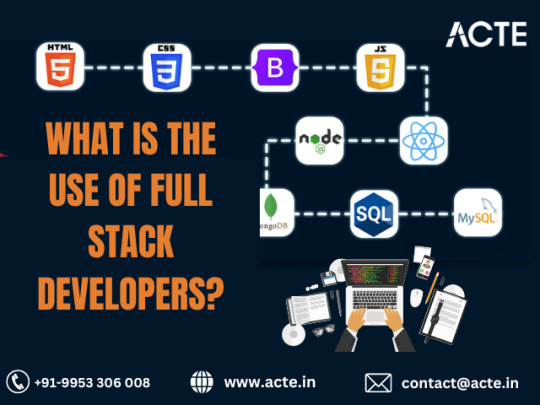
In this article, we'll delve into the essential role of full stack developers, shedding light on their pivotal contributions to streamlining development processes and fostering innovation within the industry.
1. Comprehensive Development Capabilities:
An integral aspect of full stack developers lies in their adeptness at overseeing end-to-end development projects. From initial concept to deployment, these professionals are proficient in every stage of the development lifecycle. They excel at designing intuitive user interfaces, implementing intricate frontend functionality, crafting robust backend logic, seamlessly integrating databases, and orchestrating smooth deployment of applications. This holistic approach ensures coherence and uniformity across the entirety of the project.
2. Proficient Problem Solvers:
Full stack developers possess a profound understanding of both frontend and backend technologies, equipping them with the skills to address issues at varying levels of the application stack. Their extensive skill set enables them to identify and resolve challenges efficiently, thereby minimizing downtime and ensuring the seamless operation of web applications. Whether it entails debugging frontend UI glitches or optimizing backend performance, full stack developers excel in devising effective solutions to intricate technical hurdles.
3. Collaborative Cross-Functional Engagement:
Effective collaboration is paramount in any development endeavor, and full stack developers are adept at fostering cross-functional teamwork. With their comprehensive grasp of frontend and backend technologies, they facilitate seamless communication and collaboration among designers, frontend developers, backend developers, and project managers. This cohesive teamwork ensures alignment on project objectives and facilitates smooth execution of tasks throughout the development journey.
4. Streamlined Development Processes:
The presence of a single developer proficient in both frontend and backend tasks results in a more streamlined and efficient development process. Full stack developers seamlessly transition between frontend and backend development, thereby mitigating communication gaps and reducing the need for handoffs between different team members. This streamlined approach translates into faster development cycles, rapid iterations, and ultimately, shortened time-to-market for web applications.
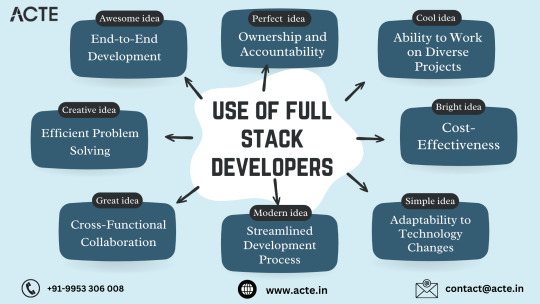
5. Adaptability to Technological Advancements:
In a landscape characterized by constant evolution, full stack developers are well-equipped to adapt to emerging trends and integrate new technologies into their projects. Their ability to stay abreast of the latest developments ensures they remain at the forefront of innovation in web development, thereby enabling them to deliver cutting-edge solutions tailored to meet the evolving needs of clients and users alike.
6. Cost-Efficiency:
Employing separate specialists for frontend and backend development can incur substantial costs for businesses. Conversely, engaging a full stack developer who can adeptly handle both roles offers a more cost-effective alternative. This approach not only reduces development expenditures but also minimizes overhead and administrative burdens associated with project management. Furthermore, having a singular point of contact for development tasks enhances communication and expedites decision-making processes.
7. Versatility in Project Execution:
Full stack developers possess the versatility to tackle a diverse array of projects, ranging from simple websites to complex web applications. This flexibility enables them to address varied challenges and contribute effectively to a wide spectrum of projects. Whether it involves crafting e-commerce platforms, content management systems, or social networking sites, full stack developers boast the expertise and adaptability to deliver bespoke solutions tailored to the unique requirements of each project.
8. Ownership and Commitment:
Often assuming ownership of the projects they undertake, full stack developers exhibit a heightened sense of accountability and dedication. This intrinsic ownership fosters a greater commitment to project success, as developers become personally invested in achieving favorable outcomes. By assuming responsibility for the entire development process, full stack developers ensure projects are delivered punctually, within budget constraints, and in adherence to the highest quality standards.
Conclusion:
In summary, full stack developers occupy a pivotal position in the realm of web development, leveraging their versatile skill sets and comprehensive understanding of frontend and backend technologies to drive innovation and excellence. By harnessing the unique capabilities of full stack developers, businesses can streamline development processes, stimulate innovation, and deliver unparalleled web experiences to their audience.
#full stack developer#education#information#full stack web development#front end development#frameworks#web development#backend#full stack developer course#technology
4 notes
·
View notes
Text
A Full Stack Developer Classes equips you with essential front-end, back-end, and database skills. Learn technologies like HTML, CSS, JavaScript, Node.js, and React to build end-to-end applications. Perfect for aspiring web developers, this course offers hands-on projects and industry-relevant training, opening doors to high-demand jobs in tech. Start your full-stack journey today!
Business name: Full Stack Developer Course In Pune
Address: Office no- 09, UG Floor, East Court, Phoenix Market City, Viman Nagar, Pune, Maharashtra 411014
Phone: 9513260566
Email: [email protected]
0 notes
Text
Best Full Stack web Development course in Indore
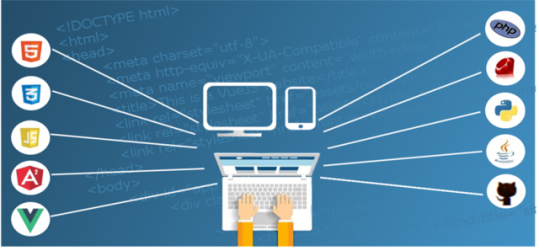
0 notes
Text
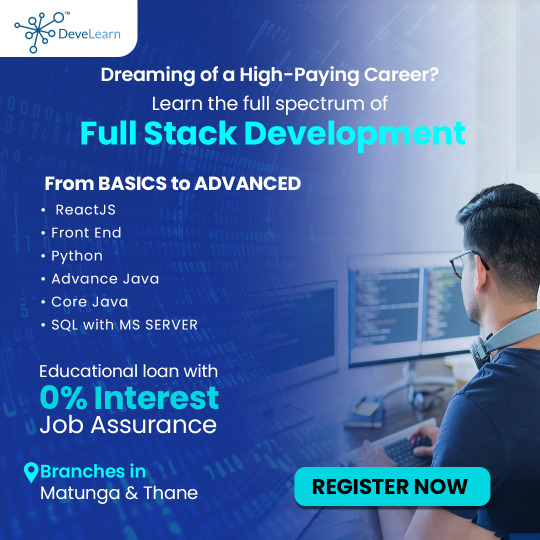
Full Stack Developer Course in Mumbai
Join the Full Stack Developer Course in Mumbai at DeveLearn who is one of the best institutes for full stack development in Mumbai. Learn from industry experts and achieve your dream job in the field of full-stack web development. Our Full Stack Developer Classes in Mumbai cover three essential development categories: Front End, Back End, and Database. We offer this comprehensive Full Stack Web Development Course in both offline & online formats, providing flexibility to suit your learning preferences. Enroll today to prepare for a successful career as a full-stack developer with placement assistance in Mumbai's thriving tech industry. Unlock your potential in the field of web development with DeveLearn Institute.
#full stack developer course#full stack developer course in mumbai#full stack development#full stack developer
0 notes
Text
The Essential Web Development Course in 2024
The digital landscape is ever-evolving, and the demand for skilled web developers shows no signs of slowing down. Whether you're a complete beginner or looking to refine your existing skillset, a web development course can be your gateway to a fulfilling and lucrative career. At IPS UNI, we offer a comprehensive web development course designed to equip you with the knowledge and tools you need to thrive in this dynamic field.
Call us at: 03340777021
Address: Al Hafeez Executive office 1506, 30 Firdous Mkt Rd, Lahore, Pakistan
Visit our website: https://ipsuni.com/
#web development course#Best Web Development Training in Lahore#Top Web Development Courses In Pakistan#Full Stack Web Development Courses#Front End Web Developer Course#Professional Web Development Training#Web Development Training#Best web development course#full stack developer course#full stack web development course#web developer classes#website development course#ccna course in lahore#it training institutes in lahore
0 notes
Text

The Complete Full Stack Developer Guide: Building Modern Web Applications
Our Full Stack Developer Course is designed to equip you with the skills and knowledge needed to become a proficient developer capable of handling both frontend and backend development tasks. Whether you're a beginner looking to start a career in web development or an experienced developer aiming to enhance your skill set, this course is tailored to meet your needs.
Throughout the course, you will dive deep into various programming languages, frameworks, and tools essential for full stack development. You'll learn front-end technologies such as HTML, CSS, JavaScript, and frameworks like React and Angular for creating interactive user interfaces. On the backend side, you'll explore server-side programming with Node.js, database management with SQL and NoSQL databases, and RESTful API development.
0 notes
